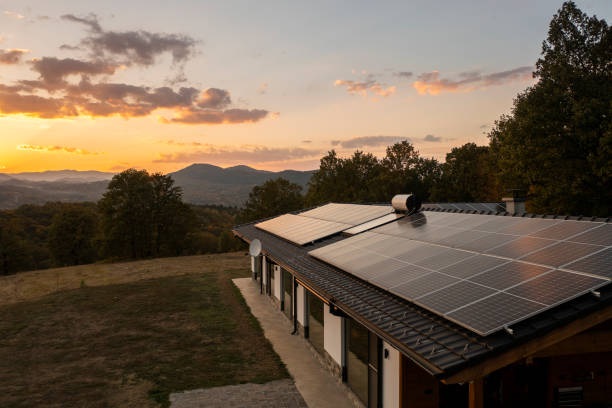☀️ Achieve energy freedom with high-quality residential solar panels 🏠. Experience self-sufficiency, savings, and sustainability 🌿💡. #SolarPower
Energy Independence
Energy independence is not just a buzzword; it’s a critical goal for national security, economic stability, and environmental sustainability. One effective way to achieve this is through residential solar panels, which allow homeowners to generate their own electricity and reduce dependence on external energy sources. By reducing our reliance on foreign energy, we can protect ourselves from fluctuating markets and geopolitical tensions. Moreover, promoting energy independence encourages local job growth in the renewable energy sector, boosts innovation, and supports sustainable practices that protect our planet for future generations.
Growing Trend Towards Solar Energy
In recent years, solar energy has gained significant momentum. As technology improves and costs decrease, more individuals and businesses are recognizing the benefits of switching to renewable sources. Governments around the world are also incentivizing this shift by offering tax credits, rebates, and grants for solar installations. Solar energy has become a crucial player in reducing carbon emissions and moving towards a greener future.
Residential Solar Panels and Energy Independence
Residential solar panels are emerging as a powerful solution to achieve energy independence. By harnessing the sun’s energy, homeowners can generate their electricity and reduce their dependence on traditional, non-renewable energy sources like coal, oil, or natural gas. This not only leads to long-term financial savings but also contributes to a healthier environment. As we face the ongoing threat of climate change, solar energy offers an effective way to reduce carbon footprints and promote clean energy solutions.
How Solar Energy Works
Solar energy works by converting sunlight into electricity through photovoltaic (PV) cells. These cells, typically made of silicon, absorb photons from sunlight, which displace electrons and create an electric current. This current is captured and used to power homes, reducing or even eliminating reliance on the traditional energy grid. Solar energy is renewable, sustainable, and virtually inexhaustible, making it a critical part of the future of energy production.
Why Energy Independence Matters
In today’s interconnected world, energy independence is essential for enhancing national security and reducing economic vulnerability. By generating your energy, you can shield yourself from energy price hikes and market volatility. It also helps nations reduce their carbon footprint and supports the transition to a cleaner, more sustainable energy system.
How Solar Energy Promotes Energy Independence
Solar energy empowers homeowners and entire nations to produce their energy from a renewable source. By doing so, it decreases the need for imported energy, which is often derived from fossil fuels. In the long run, solar power helps individuals take control of their energy consumption, while also promoting energy security on a larger scale.
Evolution of Solar Panel Technology
The technology behind solar panels has come a long way since the first photovoltaic cells were developed in the 1950s. Initially expensive and inefficient, solar panels have become more affordable, efficient, and durable over time. Today, advancements in materials and energy storage have made solar energy accessible to homeowners across the globe.
Latest Innovations in Solar Panels
Recent innovations in solar technology have focused on increasing energy efficiency and making panels more affordable for the average homeowner. Some notable advancements include bifacial panels, which absorb sunlight from both sides, and perovskite cells, which could potentially revolutionize the market with their low-cost production. These innovations make solar panels a highly attractive option for those seeking sustainable living solutions.
Why Solar Panels Are an Ideal Choice for Homeowners
Residential solar panels offer homeowners a variety of benefits, including reduced electricity bills, increased property value, and protection from rising energy costs. Government incentives further enhance the appeal of going solar by offsetting initial installation costs. Homeowners are also drawn to the environmental benefits, knowing that their energy consumption is powered by a clean, renewable resource.
Cost Savings
The financial benefits of installing solar panels can be significant. While there’s an initial investment in the system, many homeowners see a return on their investment within just a few years due to lower energy bills. Over time, the cost savings can far exceed the upfront expense, particularly as energy prices continue to rise.
Environmental Impact
Switching to solar energy dramatically reduces carbon emissions. By producing clean, renewable energy, solar panels help to mitigate climate change and decrease the reliance on polluting fossil fuels. In addition, solar energy reduces air pollution and conserves water, making it a win-win for the environment.
Increased Property Value
Homes equipped with solar panels are often more attractive to buyers, as they come with lower electricity bills and an eco-friendly appeal. Studies have shown that homes with solar energy systems sell faster and at a premium compared to those without.
Energy Reliability and Independence
One of the most compelling reasons to install residential solar panels is the reliability they provide. Solar energy can be stored in battery systems for use during power outages, giving homeowners a level of independence from the traditional power grid. This can be particularly valuable in regions prone to natural disasters or grid failures.
Successful Solar Panel Installations
A case study of a London household demonstrates how solar panel installation drastically reduced electricity costs by 50%. The homeowners reported not only financial savings but also a sense of empowerment in controlling their energy use. Over a decade, the panels generated enough savings to cover the installation cost, all while reducing their carbon footprint.
Testimonials from Solar Energy Users
Many homeowners who have switched to solar energy share similar stories: lower utility bills, increased independence from traditional energy providers, and the satisfaction of contributing to a cleaner environment. These testimonials underscore the transformative impact of adopting renewable energy solutions.
Supporting Statistics
According to recent data, solar panels can reduce household energy costs by up to 70%, depending on location and consumption patterns. Studies also show that homes equipped with solar panels reduce carbon dioxide emissions by an average of 3,000 pounds per year.
Energy Consumption
Before investing in solar panels, it’s important to assess your home’s energy consumption. Understanding your energy needs will help determine how many solar panels you need to install and the potential savings.
Geographical Considerations
Geographical factors such as the amount of sunlight your home receives, local weather patterns, and roof orientation can impact the efficiency of solar panels. It’s essential to work with a professional installer who can evaluate these factors to optimize your system.
Cost vs. ROI
While the initial cost of solar panels can be significant, the long-term return on investment is often worth it. In addition to energy savings, government incentives and tax rebates can make solar energy more affordable.
Selecting the Right Panels
When choosing solar panels, consider factors like efficiency, durability, and warranty. You’ll also want to research different brands and read customer reviews to find the best option for your needs.
Installation Process
The installation process typically involves a site assessment, obtaining necessary permits, and installing the panels on your roof. Once installed, the system will be connected to your home’s electrical system, and you can start generating your electricity.
Importance of Maintenance
Solar panels require minimal maintenance, but regular inspections are essential to ensure they operate at peak efficiency. Cleaning the panels and checking for any potential issues will help prolong their lifespan and maintain optimal energy production.
Residential solar panels offer a reliable, cost-effective, and environmentally friendly way to achieve energy independence. They provide long-term savings, increase property value, and reduce reliance on fossil fuels.
Consider Solar Panels for Your Home
If you’re ready to take control of your energy use and contribute to a sustainable future, now is the time to explore residential solar panels. With numerous options and incentives available, you can find a solution that fits your budget and energy needs.
The Role of Solar Energy in Energy Independence
Solar energy plays a critical role in reducing our dependence on non-renewable energy sources. By harnessing the power of the sun, we can achieve a more sustainable, secure, and prosperous future for all.



